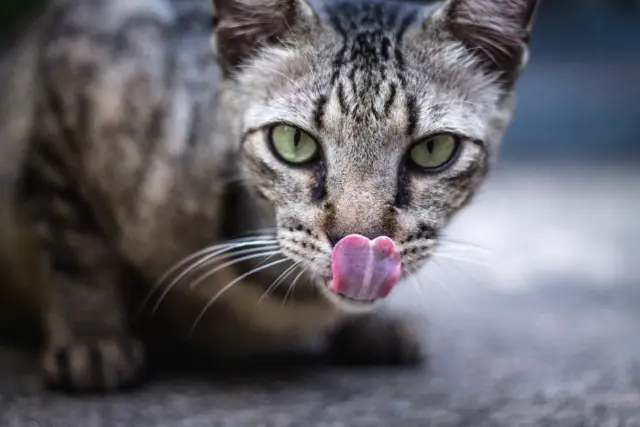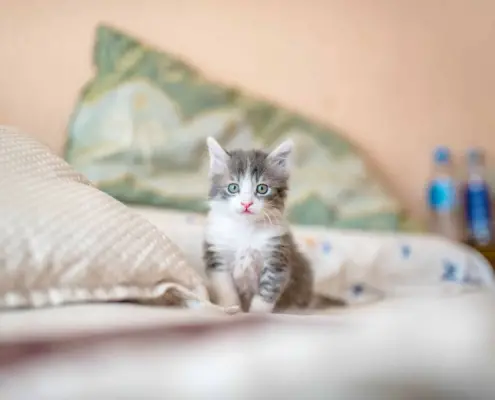
The Safari cat breed is an intriguing and captivating feline that has gained popularity among cat enthusiasts around the world. This unique breed is known for its stunning physical appearance and adventurous nature, making it a favorite among those seeking an extraordinary companion. In this article, we will explore the history, physical characteristics, personality traits, and care requirements of the Safari cat breed, helping you determine if this majestic feline is the right fit for your home.
History and Origin of the Safari Cat Breed
The Safari cat breed is a relatively new addition to the world of domestic cats. It was created by crossing the Bengal cat, known for its beautiful coat patterns, with the South American Geoffroy’s cat, a small wild feline species. The purpose of this breeding program was to develop a domestic cat with a similar appearance to the wild African serval, known for its striking coat and majestic presence.
The development of the Safari cat breed began in the early 1970s by a dedicated breeder named Judee Frank. Through careful selection and breeding, Frank successfully produced kittens with the desired traits, including a short and dense coat, distinct spots and rosettes, and a muscular physique reminiscent of their wild ancestors. Today, the Safari cat breed is recognized by various cat registries, and its popularity continues to grow.
Physical Characteristics of the Safari Cat Breed
One of the most captivating features of the Safari cat breed is its physical appearance. These cats have a medium to large-sized body, with males typically being larger than females. They have a muscular build, giving them a strong and athletic appearance. The head is rounded, with medium-sized ears that are set wide apart. The eyes are almond-shaped and can be any color, ranging from green to gold.
The most striking attribute of the Safari cat breed is its coat. The short and dense fur is adorned with distinct spots and rosettes, similar to those found on the African serval. The background color can vary, with shades of golden, tawny, or silver being common. The coat pattern is highly variable, with some individuals having a more pronounced contrast between the spots and the background, while others may exhibit a more subtle appearance. Overall, the Safari cat’s coat is a true testament to its wild heritage.
Personality Traits and Behavior of Safari Cats
The Safari cat breed is renowned for its adventurous and active nature. These cats have a strong prey drive and are known for their agility and athleticism. They love to explore their surroundings, so providing them with a stimulating environment is essential. Interactive toys, climbing structures, and puzzle feeders can help keep them mentally and physically engaged.
Despite their wild appearance, Safari cats are generally friendly and sociable. They form strong bonds with their human companions and enjoy being a part of the family. They are playful and enjoy interactive play sessions, often displaying their hunting instincts during playtime. However, it is important to note that individual personalities can vary, and early socialization is crucial to ensure a well-rounded and confident cat.
Caring for a Safari Cat – Diet, Grooming, and Exercise
Proper care is essential to keep your Safari cat healthy and happy. Providing a balanced and nutritious diet is crucial for their overall well-being. Consult with your veterinarian to determine the appropriate diet for your cat, taking into consideration factors such as age, activity level, and any specific dietary requirements.
Grooming requirements for Safari cats are relatively low. Their short coat does not require frequent brushing, although a weekly brushing session can help remove loose hair and keep their coat in optimal condition. Regular nail trims, dental care, and ear cleaning should also be a part of their grooming routine.
Due to their active nature, Safari cats require plenty of exercise to keep them physically and mentally stimulated. Interactive play sessions, puzzle toys, and access to climbing structures or outdoor enclosures can help fulfill their need for activity. Engaging in regular playtime with your Safari cat will not only provide them with exercise but also strengthen the bond between you.
Training and Socializing a Safari Cat
Safari cats are intelligent and can be trained to perform various tricks and commands. Positive reinforcement methods, such as clicker training and treats, work best with these cats. Start with basic commands like sit, stay, and come, gradually progressing to more advanced tricks. Training sessions should be short, frequent, and conducted in a positive and rewarding manner.
Socialization is equally important for Safari cats. Introduce them to different people, animals, and environments from a young age to ensure they grow up to be well-adjusted and confident individuals. Expose them to various sights, sounds, and experiences to help them develop a broad understanding of the world around them. A well-socialized Safari cat will be more adaptable and comfortable in different situations.
Health Issues and Concerns in Safari Cats
Like all cat breeds, Safari cats are susceptible to certain health issues. It is important to be aware of these potential concerns and take proactive measures to ensure the well-being of your feline companion. Common health issues in Safari cats may include hypertrophic cardiomyopathy (a heart condition), progressive retinal atrophy (a degenerative eye disease), and patellar luxation (a condition affecting the kneecap). Regular veterinary check-ups and preventive care, such as vaccinations and parasite control, are essential to maintain your Safari cat’s health.
Safari Cats as Pets – Pros and Cons
Owning a Safari cat can be a rewarding experience, but it is important to consider both the pros and cons before making a decision. On the positive side, Safari cats are beautiful and exotic-looking, making them a unique addition to any household. Their playful and active nature can provide endless entertainment, and their strong bonds with their human companions make them affectionate and loving pets.
However, Safari cats may not be suitable for everyone. Their high energy levels and need for stimulation require dedicated time and effort from their owners. They may not be suitable for households with young children or other pets, as their strong prey drive can lead to chasing and potential conflicts. Additionally, their wild appearance may come with legal restrictions in some areas, so it is important to check local regulations before bringing a Safari cat into your home.
Finding a Reputable Safari Cat Breeder
If you have decided that the Safari cat breed is the right choice for you, it is crucial to find a reputable breeder. Look for a breeder who prioritizes the health and well-being of their cats, conducts appropriate health screenings, and provides proper socialization for their kittens. Visit the breeder’s facility if possible, and ask for references from previous kitten buyers. A responsible breeder will be happy to answer your questions and provide ongoing support for your new feline companion.
Is the Safari Cat Breed Right for You?
The Safari cat breed offers a unique combination of beauty and adventure, making it a captivating choice for those seeking an extraordinary feline companion. With their stunning appearance, playful nature, and strong bonds with their human companions, Safari cats can bring joy and excitement to any household. However, their high energy levels and specific care requirements may not be suitable for everyone. Before welcoming a Safari cat into your home, carefully consider your lifestyle, commitment, and ability to meet their needs. If you are prepared for the challenge and adventure that comes with owning a Safari cat, you will be rewarded with a majestic and fascinating companion.
If you enjoyed my article, I would appreciate you sharing it with your network.

Sima Ndlebe
Sima writes for CatBuzz. He is interested in Cats, Health and Fitness, and Entrepreneurship.
Published: 13 October 2023



